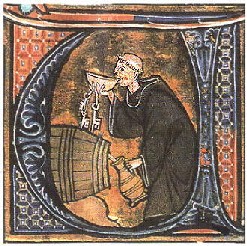Closing Thoughts on Spreading the Gospel
Welcome to the conclusion of an essential brewvana series. For the past few weeks, we’ve been discussing The Role of Beer in a Christian Life OR The Role of Christianity in a Beery Life, “The Gospel According to St. Arnold.”
If you missed the Preface, you can find it here.
If you missed Part 1–I smell a Pharisee, you can find it here.
If you missed Part 2–St. Arnold, Beer and Church Connections, you can find it here.
If you missed Part 3–What Would Jesus Brew?, you can find it here.
If you missed Part 4– Solving Christians’ Drinking Problems with Sex and Money, you can find it here.
 In the beginning, God created the heavens and the earth.
In the beginning, God created the heavens and the earth.
Somewhere along the way, beer entered the picture. And it was good. Indeed, it still is good. Some people say it’s not good, but they’re wrong.
We’re all wrong sometimes. We all win sometimes. We all lose sometimes. But what’s important is whether or not we’re obnoxious in the face of it: “The best way to be right or wrong is humbly,” sayeth some unknown wordsmith.
Over the past few weeks here at brewvana, we’ve covered a lot of ground on the the topic of Christians and Beer, turning over stones like the prohibitionist mindset, brewing monks, historical information, and Christian strategies for sex and money. We have cracked open the Bible and refuted poor Christian arguments with the Good Book itself.
In the beginning of this series, I really just wanted to have a comprehensive document that laid out reasonable arguments that beer ain’t bad. I hoped to counter the arguments of neo-prohibitionists, and generally aimed my concerns toward Conservative Christians, as they are both organized and squeaky-wheeled, where progressive legislation toward alcohol is concerned. For those of us that put effort into the Pop the Cap movement in North Carolina, the name Reverend Creech strikes a chord. I hope Reverend Creech Googles his name, reads this entire series and sees the light.
As the series progressed, I received a number of positive comments, messages and emails from Christian beer drinkers throughout the land. I hadn’t set out to create a support group, but it’s been cool to have conversations with people that think like I do. For my part, I didn’t really think it mattered if I were a Christian or not. That was a superfluous detail. But with God, nothing’s superfluous. A non-Christian may not have given this crap much thought, may not have cared to present it carefully, honestly or in a balanced manner. That’s been my effort.
Of course, the Trappist Monks are a quick and easy and fabulous place for beer lovers to point Christians toward to say, “look there’s history here, there’s moderation that’s paramount, there’s quality unrivaled.” There are many other places where the Church and the Beer intersect. St. Arnold Brewing Company comes to mind, as they borrowed Arnold for their brewery name as I have for my Gospel series. The Church Brew Works (pictured above) scores bonus points, as they installed their brewery in the sanctuary of an old church. On the Jewish front, Shmaltz Brewing Company brews up the tasty libations as well. Not to mention scores of other breweries, beers and labels with nods in the church’s direction. Right now, for instance, I’m specifically thirsty for Great Divide’s St. Bridget’s Porter, and it happens to be named for the Irish saint of the same name.
 The Lost Abbey‘s Tomme Arthur was kind enough to take the time to impart his thoughts on the Christian imagery used in their branding. A concept that has been in the works for around 10 years, “The notion of a ‘Lost Abbey’ is great as it allows us to go in many directions. I grew up Catholic and attended Catholic Grade and High School. It’s easy to say that I have been indoctrinated. Much of the imagery and branding comes from my Catholic upbringing.”
The Lost Abbey‘s Tomme Arthur was kind enough to take the time to impart his thoughts on the Christian imagery used in their branding. A concept that has been in the works for around 10 years, “The notion of a ‘Lost Abbey’ is great as it allows us to go in many directions. I grew up Catholic and attended Catholic Grade and High School. It’s easy to say that I have been indoctrinated. Much of the imagery and branding comes from my Catholic upbringing.”
While the Lost Abbey beers speak for themselves, there’s a story to be told on a label. “I think one of the easiest things to see in the brand is the strength of the storytelling,” said Arthur. ” “It’s something I am very interested in. On top of that, our biblical and religious histories are rich in stories and traditions. What I tried to capture is this essence. We want to give people a reason to talk about our beers and help them remember what they are supposed to be saying. The challenge of the imagery, as I have been reminded, is that this is not religion in a class, bottle or keg. With that in mind, I am always challenged to invoke without preaching when it comes to our beers. I used to believe in religion a hell of a lot more than I do now. As such, I’m a recovering Catholic. But I still see so much opportunity in the history of the Christian world for our beers. It seems like we’ll never run out of material.”
Arthur may not have set out to be a preacher, but his words echo some sound advice I’ve gotten from a few wise men I’ve encountered. Religion isn’t nearly as important as a relationship. From my perspective, Conservative Christian neo-prohibitionists are getting this one wrong where alcohol is concerned. I’ve compared them to the Pharisees, and stick by that assertion. They’re making up rules. They’re drawing lines in the sand. They’re diverting attention from more important issues and broader remedies for the problems we face. I don’t see where the Bible backs them up. And our culture is suffering as a result. It’s a bad case of Irony.
I think neo-prohibitionists blaspheme something fierce when they run their game. They might think that The Church Brew Works is a blasphemic use of God’s house, but I think that place is beautiful. There will always be offenders and the offended, and ultimately we’ll all learn the Truth one day.
Until that day, I propose agreeing to disagree. More than “having respect for someone’s opinion,” it’s important to “treat that person respectfully.” I don’t have respect for every person I encounter, but I treat them kindly–mostly. Perhaps a conversation between Lisa Simpson and Apu is in order. Remember the episode in which Lisa became a vegetarian? At the end of the show, Lisa was up on Apu’s roof, accompanied by Paul and Linda McCartney, when it came out that she ate cheese. Apu remarked that he did not eat anything from an animal.
Lisa: You must think I’m a monster!
Apu: Yes, indeed, I do think that. But I learned long ago, Lisa, to tolerate others rather than forcing my beliefs on them. You know, you can influence people without badgering them.
I propose avoiding idolatry. What is the Church? The building or the people in it? Well, it’s the people, of course. Yes, the building ought to be treated with respect, like the people in it, like the Idea for which those people stand. Idolatry is a no-no for Christians. This can be idolizing false gods, Quentin Tarantino, football or beer (as well as many other entities). To the list of things we shouldn’t idolize, we might add, a distorted perception of Church. It hurts the Church and impacts others as well.
There are a few Christians out there that “get it:” Sojourn Church, in Huntsville, Alabama, used to meet in a brewery. “Folks are talking about it,” writes founding pastor David Thew on the church’s website. “Many are intrigued. Some are incensed. We do it to contextualize the gospel, without compromising the gospel, to take the gospel to as many people as we can. May God help us to do this in our ‘Jerusalem, Judea, Samaria and the ends of the earth (Acts 1:8).'”
Sojourn has a healthy attitude toward beer. Like Mars Hill, a church that a reader posted in a comment, Sojourn makes it a point to openly discuss their beer beliefs on their website. This is good.
I propose moderation. Drinking isn’t bad. Drunkenness is bad. The Bible even says so.
Finally, I propose that everyone get educated. I understand living on faith, but there’s a lot more to learn out there. Learn about history, whether beer-related (“Battles have been fought and won by soldiers nourished by beer.”-Frederick the Great), church-related (“The selling of bad beer is a crime against Christian love.”-Martin Luther), or otherwise (“These clothes are good enough to drink in, and so be these boots, too.”-William Shakespeare). It all intersects.
Further, I say we educate our children. This starts in the home. There should be discussion and role modeling throughout the child’s life. Do have a beer or glass of wine in front of your children (preferably on a regular basis). Don’t get loaded. Do field their questions. Don’t fear monger on the subject.
Tempers flare on this topic, born out of passion on both sides. Like beer, passion is good. It’d be a whole ‘nother topic to toss in the notion of lowering the alcohol age, but in the grand scheme of things, I think it’d be better and safer for our country to focus on building a solid foundation of education and moderation. Since this issue is linked to the broader subject of this Gospel series, I’d like to point everyone to Choose Responsibility, a group seeking balance, maturity and common sense with regard to alcohol.
Hmmm…balance, maturity and common sense. What mission could be better?
Cheers and Amen!









As I MAGL student at Fuller, I am writing a paper on how we should “tap” into the bar/pub culture as missional followers of Jesus. I have scanned many blogs and articles on the web and I have found yours to be the most helpful of all. I will be citing this article in my paper for sure!
Yep, I had a co-worker who insisted up-and-down that what Jesus produced at the wedding and shared at the Last Supper was not wine but “grape juice.” Doesn’t that mean the Bible is _wrong?_ Was it even possible to keep grape juice around in a middle eastern climate for more than a day before germs or yeasts got into it. Never mind, that’s what he believed.
Another head-scratcher he had was the “proof” that alcohol is forbidden is because of the incident in which Noah got drunk and his sons saw him naked. Years later, I would read that somehow, this whole passage was twisted into the justification for enslaving Africans (Noah’s son Ham was described as “black”). And this guy was himself African-American.
Well, I’m a lifelong Catholic whose parish is currently run by a South-Side Irish Chicago native, so we don’t face that kind of dichotomy where I am.
Great series.
greetings –
noah, after the flood, and lot in the cave with his daughters, are the first two accounts of bein’ drunk in the bible. yet, it was not they that were mentioned for sinnin’, but them that took advantage of the drunks.
Great thread. The Bible tells us not to get drunk… nothing about never drinking.
check out http://christianbeerconnoisseur.wordpress.com/ for a similar perspective
That was some of the best reading I have done in a long time.
Great articles and a fantastic education for 73 year young home brewer…